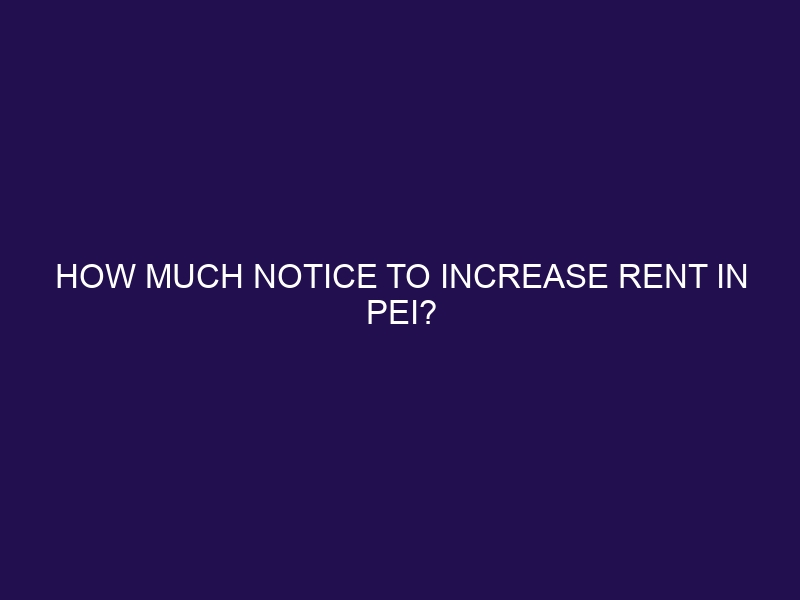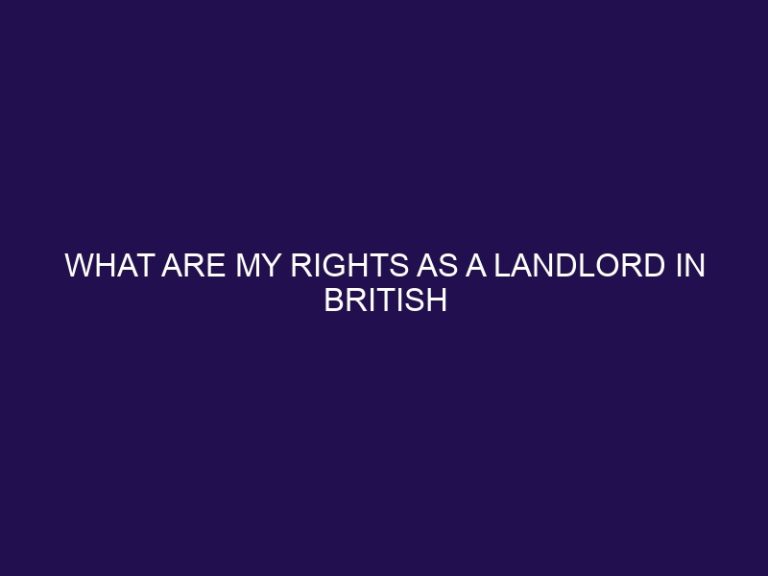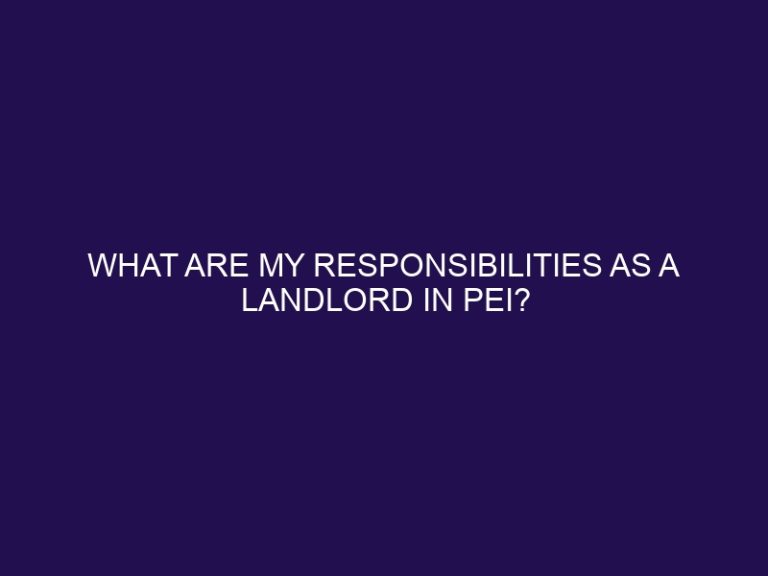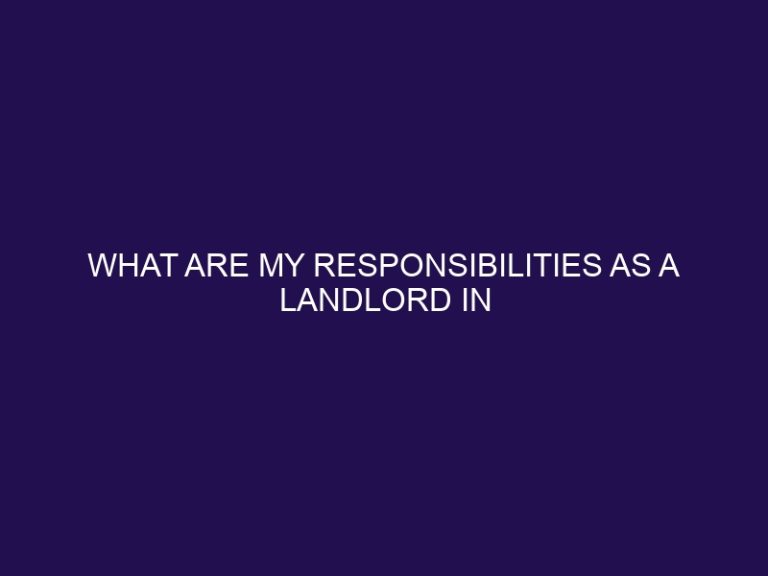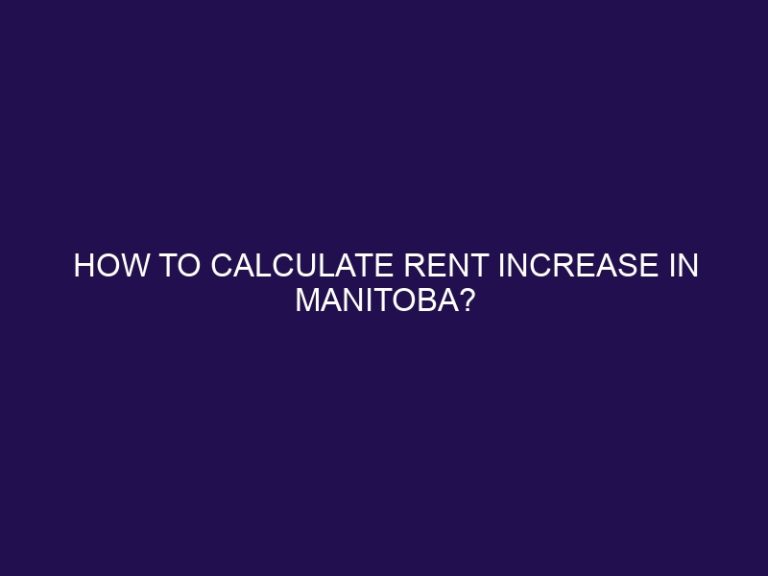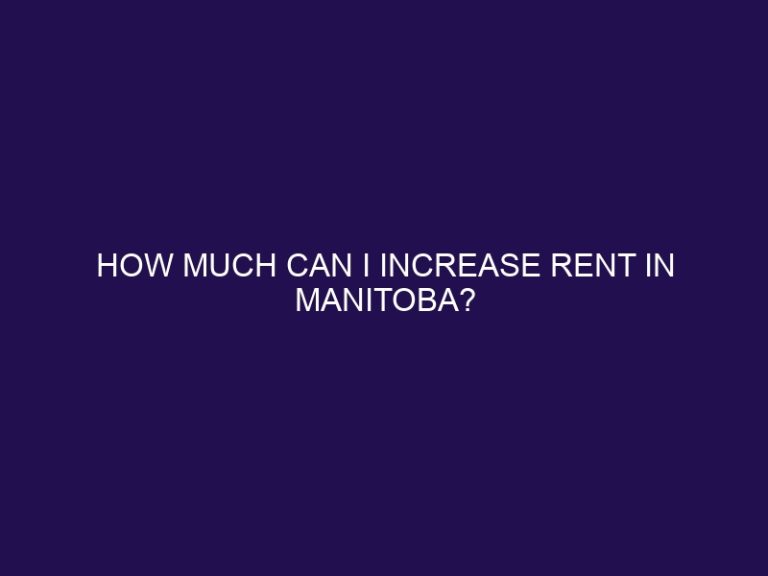How much notice to increase rent in PEI?
.jpg)
Rent increase laws vary from province to province in Canada, including in the province of Prince Edward Island (PEI). Understanding these laws is essential for both landlords and tenants to ensure that any rent increase is in compliance with the regulations. The regulations for rent increases in PEI are governed by the Residential Tenancies Act.
To properly navigate the process, it is important to understand what constitutes a “Notice to Increase Rent” and the guidelines related to the amount of notice required. In PEI, the specific notice period depends on whether the tenancy is month-to-month or fixed-term.
For month-to-month tenancies, landlords are required to provide a certain amount of notice to their tenants before increasing the rent. For fixed-term tenancies, the rules may differ.
However, there are exceptions to the notice period based on specific situations, such as substantial repairs or renovations that require the unit to be vacant.
It is crucial for landlords to provide sufficient notice in accordance with the regulations. Failure to do so could result in consequences or the invalidation of the rent increase.
Understanding the notice requirements and following them diligently is key to ensuring a smooth and legal process when increasing rent in PEI. By adhering to the regulations, both landlords and tenants can maintain a fair and transparent rental relationship.
Key takeaway:
- Understanding rent increase regulations in PEI: Familiarize yourself with the laws regarding rent increases to ensure you comply with the necessary notice periods and avoid legal complications.
- Notice to increase rent for month-to-month tenancies: In PEI, landlords must provide a written notice at least three months before increasing the rent for month-to-month tenancies, allowing tenants adequate time to prepare for the change.
- Notice to increase rent for fixed-term tenancies: For fixed-term tenancies, landlords can only increase the rent after the agreement expires, provided proper written notice is given in accordance with the province’s regulations.
Understanding Rent Increase Laws in PEI
Understanding rent increase laws in PEI is crucial for landlords and tenants. In PEI, it is a requirement for landlords to give written notice to tenants at least three months in advance prior to increasing the rent. This notice must specify the amount of rent increase and the effective date. There are certain exceptions where landlords may not need to provide notice, such as if the tenant agrees to the increase or if it is stated in the rental agreement. It is essential for both parties to be aware of their rights and responsibilities to maintain a fair and harmonious rental relationship.
True story: John, a resident of PEI, received a notice from his landlord regarding a rent increase. Initially, he was unaware of the specific laws regarding rent increases in PEI. However, after conducting thorough research and gaining an understanding of his rights, he approached his landlord and expressed his concerns. Through an open conversation, they were able to reach a mutual agreement that was fair for both parties. John’s comprehension of the rent increase laws in PEI proved to be invaluable in effectively navigating the situation.
What are the Regulations for Rent Increases in PEI?
In Prince Edward Island (PEI), there are regulations in place for rent increases to protect tenants. Landlords must provide proper notice and comply with specific guidelines. So, what are the regulations for rent increases in PEI? Here are some key points to consider:
| – Regulations: | PEI has specific regulations governing rent increases to ensure fairness for tenants. These regulations are in place to protect tenants from unreasonable rent increases. |
| – Notice: | To comply with the regulations, landlords must provide written notice to tenants about any planned rent increase. This notice is essential for tenants to be aware of the upcoming changes in their rental payments. |
| – Month-to-Month Tenancies: | For month-to-month tenancies, landlords must provide at least three months’ notice before increasing the rent. This allows tenants sufficient time to adjust their budgets and plan accordingly. |
| – Fixed-term Tenancies: | In the case of fixed-term tenancies, rent cannot be increased during the term unless it is clearly stated in the lease agreement. This provision ensures that tenants are not caught off guard with unexpected rent hikes. |
| – Exceptions: | While the general notice period is three months, there are certain situations where the notice period may vary. For example, if renovations or repairs are required on the rental property, landlords may need to provide a different notice period to tenants. |
| – Non-compliance: | It is crucial for landlords to adhere to these notice requirements. Failure to comply may result in tenants having certain rights and the ability to seek legal remedies. These remedies provide a means of protection for tenants if their landlords fail to follow the regulations. |
In summary, the regulations for rent increases in PEI aim to create a fair and transparent process for both tenants and landlords. By understanding these regulations, tenants can ensure their rights are protected, and landlords can fulfill their obligations in a responsible manner.
What Constitutes a “Notice to Increase Rent”?
When it comes to rent increases in PEI, understanding what constitutes a “Notice to Increase Rent” is crucial. This important legal document, provided by the landlord to the tenant, serves as a written notice informing them about the planned increase in rent. In compliance with the regulations set by the Residential Tenancy Act of PEI, the notice must clearly state the amount of the increase and the effective date. To ensure the validity of the notice, it is recommended to utilize the prescribed notice form provided by the Residential Tenancies Office. It is always wise to keep a copy of the Notice to Increase Rent for your records as a pro-tip.
How Much Notice is Required to Increase Rent in PEI?
Discover the ins and outs of rent increases in PEI! In this section, we’ll dive into the topic of how much notice is required to increase rent in PEI. Whether you are a tenant or a landlord, it’s essential to know the rules governing rent adjustments. We’ll explore the specifics for both month-to-month tenancies and fixed-term tenancies, highlighting the timeframes and regulations you need to be aware of. Stay informed and empowered when it comes to rental agreements in PEI!
For Month-to-Month Tenancies
In PEI, for month-to-month tenancies, landlords are legally obligated to provide written notice to tenants regarding any rent increase at least three months in advance. This notice should contain details such as the new rent amount, the effective date of the increase, and an explanation justifying the raise. Failing to provide adequate notice may render the rent increase invalid. It is crucial for tenants to have knowledge about their rights and the regulations governing rent increases to ensure fair treatment.
As a matter of fact, the Residential Tenancies Act in PEI strives to establish a balanced and equitable rental market, safeguarding the rights of both landlords and tenants.
For Fixed-term Tenancies
For fixed-term tenancies in PEI, there are specific regulations regarding rent increases. Here are the steps to follow:
- Review the terms of the lease agreement to determine if the landlord has the right to increase rent during the fixed term for fixed-term tenancies.
- If the lease allows for rent increases, the landlord must provide written notice to the tenant for fixed-term tenancies.
- The notice must specify the amount of the rent increase and the effective date for fixed-term tenancies.
- The notice should be given at least three months before the increase takes effect for fixed-term tenancies.
- The tenant has the right to accept the rent increase or terminate the tenancy for fixed-term tenancies.
In PEI, landlords must follow these steps when increasing rent for fixed-term tenancies. Failure to do so may result in legal consequences.
Exceptions to the Notice Period
When it comes to increasing rent in PEI, there are instances where exceptions to the notice period apply. In this section, we’ll explore the different situations that may vary the notice period. From unexpected circumstances to specific tenant situations, we’ll uncover the factors that can influence the amount of notice required for rent adjustments. So, let’s dive into these exceptions and gain a better understanding of the variations in the notice period.
Situations Where the Notice Period May Differ
In PEI, there are specific situations where the notice period for rent increases may vary from the standard regulations. These situations, where the notice period may differ, include:
| 1. Temporarily reduced rent: | If the landlord has previously lowered the rent for a fixed period of time, they may have the opportunity to increase it once the discounted period expires. However, it is important for the landlord to still provide proper notice. |
|---|---|
| 2. Subsidized housing: | Tenants residing in subsidized housing may be subject to different rules regarding rent increases, which are determined by the housing program they are a part of. |
| 3. Guideline adjustment: | In certain cases, the government may make adjustments to the guideline for rent increases, resulting in a requirement for a different notice period. |
To ensure compliance, landlords and tenants should thoroughly review the specific regulations pertaining to these situations.
What Happens if the Landlord Does Not Provide Sufficient Notice?
If a landlord does not provide sufficient notice when increasing rent in PEI, it can have consequences. What happens if the landlord does not provide sufficient notice? According to the Residential Rental Property Standards, if proper notice is not given, the tenant may not be obligated to pay the increased rent amount. The tenant can file a complaint with the Residential Tenancy Office against the landlord for not adhering to the required notice period. It is important for both landlords and tenants to be aware of the specific notice requirements outlined in the PEI Residential Tenancy Act to avoid any legal issues or disputes.
Some Facts About How much notice to increase rent in PEI?
- ✅ Prince Edward Island has rent control that limits rent increases beyond a set percentage each year. (Source: Renting PEI)
- ✅ Landlords must apply to the Rental Office for approval if they want to increase rent beyond the allowable amount. (Source: Renting PEI)
- ✅ The allowable rent increase is determined annually by the Island Regulatory and Appeals Commission (IRAC), based on factors such as vacancy rates, economic outlook, and submissions from landlords and tenants. (Source: Renting PEI)
- ✅ Landlords must use Form 10 – Notice of Increase in Rent of Residential Premises to communicate the increase and provide at least three months’ notice. (Source: Renting PEI)
- ✅ If landlords want to increase rent beyond the allowable amount, they must apply to the Director of Residential Rental Property using Form 12 – Application by Lessor for Approval of Rent Increase Exceeding Percentage Allowed by Regulation. (Source: Renting PEI)
Frequently Asked Questions
How much notice is required to increase rent in PEI?
Landlords in PEI must provide tenants with at least three months’ notice of a rent increase. This notice must be given on Form 10 – Notice of Increase in Rent of Residential Premises.
What is the allowable rent increase for this year in PEI?
In 2020, landlords on PEI can increase rent by 1.3% for all rental units. However, for 2024, the Director of Residential Tenancy has set the maximum Annual Allowable Rent Increase at 3% for all rental units.
Can landlords increase rent beyond the allowable amount?
Landlords who want to increase rent beyond the allowable amount must apply to the Director of Residential Rental Property using Form 12 – Application by Lessor for Approval of Rent Increase Exceeding Percentage Allowed by Regulation. The Director can approve, partially approve, or deny the rent increase after a hearing.
What happens if a landlord increases rent without following the rules?
Unlawful rent increases occur when landlords increase rent without applying to the Rental’s Office or not following the rules. Landlords cannot charge an above allowable increase in rent without obtaining an Order from the Director of Residential Rental Property.
Can landlords increase rent when a new tenant moves in?
Landlords cannot increase rent when a new tenant moves in unless they follow allowable increase rules or make the appropriate application to the Rental’s Office. Proper notice, at least three months’ notice, must be provided to tenants regarding any rent increase.
What is the process for challenging a rent increase in PEI?
Tenants who wish to challenge a rent increase can do so by submitting a Form 13 – Tenant Notice of Annual Allowable Rent Increase to the Rental Office. This form must be submitted within three months after receiving notice of the rent increase. The Director of Residential Rental Property will review the case and make a determination.

